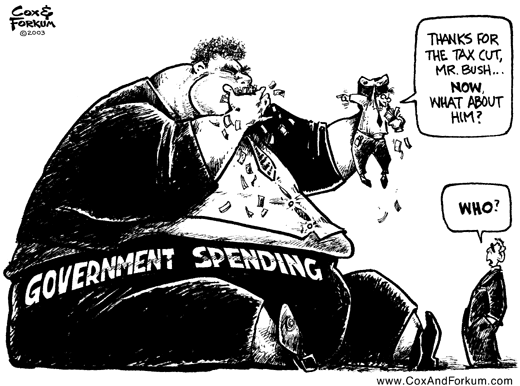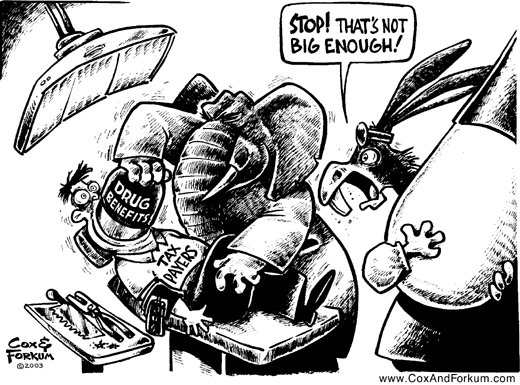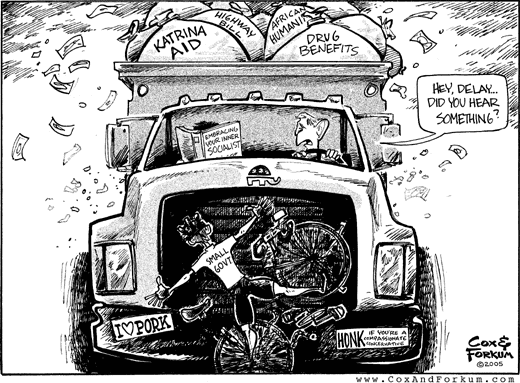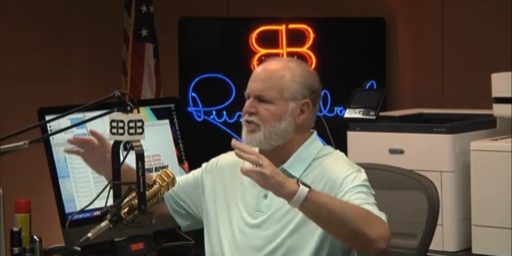More Republican Pablum
This time from David Limbaugh. Limbaugh writes the following,
It’s past time for President Bush to make a strong push to extend his income tax rate reductions before they expire in a few short years. The tax cuts have been instrumental in stimulating economic growth, and their extension is absolutely essential to meet the onerous challenges we’ll be facing, including the ongoing war on terror and rising fuel prices.
Does this claim hold any water? If we look at the labor market the answer is, in my view, no. The problem is that when we look at the employment data we see nothing from the tax cuts. Here is a graph of the data from the Bureau of Labor Satistics (click it to get the larger picture).

That is a graph of employment since 1996. The tax cuts don’t appear to have done much to stimulate growth in employment. In looking at the graph we see that employment declined at the start of 2001 (about the time the recession started) and stopped declining right around the start of 2002. However, what do we see in terms of the slope of the growth in employment before the recession and after? They look pretty much the same. That is, it appears that the tax cuts have added nothing to job growth. In fact, doing a simple regression on 1996 to 1999 get a slope of 186.08, but from 2002 onwards the slope is 150.94. In other words, employment growth has been slower after the end of the recession even with the tax cuts.

What about economic growth? That isn’t that great either, IMO. Here are the percentage changes in GDP from 1996 to 2005,
- 1996: 3.7
- 1997: 4.5
- 1998: 4.2
- 1999: 4.5
- 2000: 3.7
- 2001: 0.8
- 2002: 1.6
- 2003: 2.7
- 2004: 4.2
- 2005: 3.5
Things don’t start to look good again till 2004 (if you look at the quarterly date we could extend this back to the second quarter of 2003).
If this is what the tax cuts produced then this economy is in some serious, serious trouble. In reality, my guess is that the tax cuts had little impact on the economy.
The basic idea is that the President has little to no control over the economy. In fact, I bet we could find conservatives who made this point when the economy wasn’t doing so great back in 2001 and 2002. But now, well it is a different story. Our economy would suck if weren’t for those tax cuts. So lets extend them.
The problem is that the Republicans have absolutely no stomach for cutting spending to keep the budget from ballooning up. Deficits today translate into higher taxes in the future. Add in the fiscally reckless policies of Bush when it comes to the Medicare Prescription Drug Program and we are looking at some pretty substantial tax increases in the not too distant future. And what does Limbaugh say we should do? Extend the tax cuts because that is what is driving this expansion.

Limbaugh writes,
First, they say that our deficits have skyrocketed under President Bush (which is true) because of his tax cuts (which is patently false).
I don’t know what to call this other than a lie. Granted the recession wasn’t kind to tax reciepts and we would have likely had a deficit without the tax cut, but the tax cuts also weren’t good for tax revenues either.
Limbaugh then goes on to give us a stellar example of bad math,
As Mark W. Smith points out in the newly released paperback version of his “Vast Right-Wing Conspiracy Handbook,” “President Bush’s tax cuts produced a 14.6 percent increase in federal revenues in 2005 over those in 2004.”
I’m sorry, but look at the data. 2004 and 2005 is when the economic growth kicked in and employment got back to its pre-recession levels. Gee…could that have had anything to do with the increase in tax revenues? This is supply-side reasoning at its worst. Taxes went down and tax revenues went up, therefore the increase in tax revenues were due solely to the decline in tax rates?

As much as it pains me to say this, extending the Bush tax cuts is a bad idea. At least unless there is some serious spending cutbacks in the near future. Since Bush has shown to be not simply completely disingenuous about his pledges to restrain spending, but to be a profligate spender extending the tax cuts would do little other than ensure that down the road there will be even larger cuts to come. Bush has done more than any Democrat in the Congress or the Senate to, in Limbaugh’s words, empower government.






I think you need to take into account the destructive effect 9/11 and its aftermath had on the economy, which ran on for several years — including the liberation of Afghanistan and Iraq. Can you say definitively, ceteris paribus, that we would be where we were for 2004 and 2005 without the tax cuts?
Check out MyGOP.
Far be it from me to defend the Bush approach to handling the economy but I think the underlying problem is that everybody (by which I mean the Administration, the Congress, and the public) is operating under flawed assumptions. They’re waiting for things to get back to normal i.e. to the way things were in the late 90’s. They are back to normal.
Economic growth at the end of the 20th century was extraordinary due to an unusual confluence of events: years of business investment in computer technology finally paid off, the dot com boom was on, and there was a lot more business investment in technology in anticipation of Y2K. That was then and this is now.
I think that the GDP and employment growth is pretty darned good considering the size and maturity of the economy and the dearth of business investment. But the Congress and the Administration should stop waiting for faster growth to allow them to keep spending like drunken sailors (with apologies to any drunken sailors who might be reading this comment).
One can argue both ways on this with out any real proof. As far as anyone being a liar it works the same way, no real proof.
With such a complex economy and so many statistics (job growth, unemployment, GDP growth, tax receipts, overall revenue…) it’s very difficult to reach firm conclusions in the short term.
Like others have said, post 9/11 economic trends are tricksy to read, understand, and especially predict.
How about supporting the tax cut because it’s our money and we don’t trust the government to not spend it on some stupid earmark? How about starving the beast from our end? Sure we may drive up the deficit to obscene levels but maybe that’s the only way to get spending under control.
I can lobby for spending cuts and tax cuts at the same time and hope the congress does the right thing with both. I find it misguided to support spending cuts alone knowing the congress will spending those tax revenues if they keep coming in.
“Sure we may drive up the deficit to obscene levels” [and seriously erode our children and grandchildren’s standard of living because we’re selfish gits like no other American generation in history] “but maybe thatâ??s the only way to get spending under control.”
Good idea if you have no kids or any concern whatsoever for our country’s future.
Steve,
Are you completely insane? Oh wait, you are a liberal.
Old, old liberal rebuttal to tax cuts, Steve. But gee, every time we repubs cut taxes, revenues go up. Yes, yes, Clinton raised taxes, but by only a small amount.
The crux of liberals argument? If we hadn’t cut taxes, the economy would still have grown as much, and people wold have earned as much, and we would have had those revenues in the treasury to offset the deficit. But….that is WRONG!!!!!!! The money would NOT have come in! God Steve you and the liberals are such MORONS!!!
“Every time we repubs cut taxes, revenues go up.”
No every time you Repubs spend trillions of dollars borrowed from China or Japan, you pretend the little that makes its way into the tax coffers “revenues.”
make that “are ‘revenues’.”
i agree with schuler. i can’t defend bush, but i think we ought to point fingers at congress moreso than the president. it is congress that writes legislation and appropriation bills, after all. the president just thumbs them up or down. we have republican leadership (i use the term lightly) in congress to blame for our spending problems in washington. and yes, bush’s compassionate conservatism ain’t helping matters either.
but to suggest that the bush tax cuts are bad policy because washington politicians spend too much is the most ludicrous thing i’ve read all week. so i suppose you’re suggesting that we should send washington MORE of our money, and then they’ll be encouraged to spend LESS of it? please tell me this is a tongue in cheek joke. typically this blog is commonsensical and logic-based. obviously, that’s not the case today. whatever you’re smoking, bro, pass the pipe.
Roger, what do you mean? I’m not a liberal math drop out, so why would I count borrowings as revenue? The fact is TAX RECEIPTS have gone up, waaaaay up! (20% for corporations! almost that for all individuals!) Tax receipts UP! One more time: TAX RECEIPTS are UP! They are UP even though the amount we tax has been CUT. You don’t see a correlation? You’re going to turn a blind eye? Even the hero of libs, Kennedy, saw the truth! OMG catch a frigging clue!!!
I majored in engineering not economics, so I’m still trying to wrap my brain around Roger’s comment. How exactly does any debt we may have incurred with Japan or China cause tax revenues to go up?
I would just love to be reading these same posts if economic growth had been around 1% for the past few years. I can make a guess at who’s fault it would be.
I think Roger’s point is that the increased spending eventually finds its way back into the treasury as taxes. Increase spending on some sort of welfare benefit and there will be a slight increase in tax revenues as those benefits are taxed as income. Further, there is the view in eocnomics that government spending can promote economic growth to some degree which also gets taxed. If a contract is let out for $1 billion part of that will go to the salaries of engineers and people working on the contract and they will pay taxes. Further, those people will spend their income to buy various goods, thus increasing the incomes for the people selling the goods and thereby taxes. It isn’t uncontroversial, but that is the reasoning.
Christopher,
I am not a liberal. I’d much, much rather have lower taxes. The problem is that the supposed “conservatives” in the Congress and White House have done such a rotten job at being conservatives that continuing the tax cuts and all the massive spending is going to cause lots of problems. The problem is that the Republicans are in actuallity moderate liberals who think government spending is just spiffy.
Steve, at least, can read. Chris and Matt, most public libraries offer some form of free tutoring programs for slow learners. Free means it wouldn’t cost you anything. Check it out.
win all the screaming about tax cuts cutting our potential income at the tax coffers, we’ve apparently lost sight of the fact that we have within the last year set a record , some $274,000,000,000.00, in revenue that we would not have had if not for the tax cuts. Steve, you really need to check the CBO figures for this.
some $274,000,000,000.00, in revenue that we would not have had if not for the tax cuts.
Yeah the 10 or 12 billion per year in tax cuts caused all the revenue increases, the 300 to 400 billion in borrowed money dumped into the economy had nothing to do with it.
As much as I like to harass Steve with my limited understanding of economics, I thought he explained the situation well both in the post and in the comments. If you all what to keep the tax cuts cut the spending, but good luck getting corporations to do without their subsidies and loan guarantees not to mention Medicare and Medicaid. But the three biggest line items are the Military, SS (which is currently fully funded by the payroll tax) and the interest on the debt. Sure we could whack SS completely but unless you want to continue to collect the payroll tax that will only add to the deficit. So you have to cut the military (you can�t cut interest on the debt). Good luck with that. You can try to squeeze out some savings in pork and earmarks, and I support that but it won�t make a huge dent and given that fact that it�s pork that = power in Washington it�s a game for people who don�t want to be reelected.
Gee, Roger, while I disagreed with you in my comment, I don’t recall attacking you personally. Are you so insecure about your argument that your only recourse is personal attack? So sad, and yet so typical.
(Thank god the librarian was around to type this out for me)
Steve,
So…you think that since repubs can’t control spending, we should just stop cutting taxes. Well, “conservative” Steve, that makes absolutely no sense. Two problems we have, taxes and spending. Lets continue to lower taxes, and work on congress to lower spending.
And Steve, if you don’t see the benefits of lower taxes, you are NOT a conservative.
I keep watching for someone to just say it…2 wars at one time are funding the growth in the economy…not tax cuts. We are borrowing hundreds of billions to fight these wars and a major portion of that money is going into American corporations. That in turn creates growth which leads to bigger tax revenues.
Bithead,
Please, I think the best way to look at that “record” is as a percentage of GDP. That is how I think deficits should be looked at as well. Note that these supposed “records” tend to become non-records when looked at in this manner.
Christopher,
Please, where did I say I was a conservative? I am neither a liberal nor a conservative.
And yes, I think that cutting taxes while going crazy with the spending is a bad, bad thing. I don’t want to have my retirement taken away because of the idiots in Congress.
As for the benefits of lower taxes, look at the research. Cutting taxes has had, at best, a spotty record in terms of improving the economy. This suggests that the taxes we have are somewhere in the “right range” and can fluctuate up and down by moderate amounts.
Why Laura, are you suggesting that it is the fiscal stimulus of the increased spending!?!?!? Why you liberal poo-poo head you!
Take a look at some past recessions and how long it takes to come out. You are starting your data in 1996 when the economy was going strong.
From what I can see, we dropped capital gains by a 5% and we saw an increase in revenue on the tax by 79% (I’m doing the numbers from memory, but they should show the idea that a small reduction has instigated a large increase in revenue collected. Is this a short term or long term effect? Would increase taxes stop or slow down the recovery? All of these things are real hard to prove one way or the other.
YetanotherJohn,
Please do that, you’ll see that in terms of unemployment/employment past recessions were actually better in that the labor market rebounded much, much faster. That is one reason why it took the NBER forever to finally declare this last recession over.
The problem here isn’t selective sampling, just that tax cuts don’t have the impact many want them to have.
The key to understanding how tax cuts produce additional revenue is primarily observing the spending habits of ordinary citizens. If you are a tax-paying citizen you earn an income, pay income taxes on it, and then spend the balance on either goods or services.
The provider of those goods or services, providing they too are a tax-paying citizen or corporation, covers their expenses and restocks their shelves, pay their employees, then they pay taxes on the taxable income.
Their employees take the income they earn and assuming they are paid enough to be a tax-paying citizen, pay taxes on their income, then spend their balance on goods and services. And round and round it goes. The more times that money makes it into a tax-paying citizen’s hands as income, the more residual revenue the government makes.
When the economy is perking along like it has been for the last couple of years, there’s a good possibility that your money you originally earned is taxed as someones income 2 or 3 or even more times than in a stagnant economy like we had in the late 70’s. Revenue turnover is the engine that finances our government and our economy. I’m pretty sure Reagan understood that, and it seems that Bush does also.
Dougrc,
I understand the Laffer curve, the problem is that there is little to no evidence that we are on the right hand side of the curve.
Matt, you didn’t disagree with my comment. You never addressed it. Nonetheless, my humor was more appropriate to Christopher. Apologies for including you. Sorry you found it so disturbing.
In answer to your question, not a bit. Glad the librarian was there for you. 😉
“I keep watching for someone to just say it . . . We are borrowing hundreds of billions . . . and a major portion of that money is going into American corporations. That in turn creates growth which leads to bigger tax revenues.”
That’s what I said, Laura.